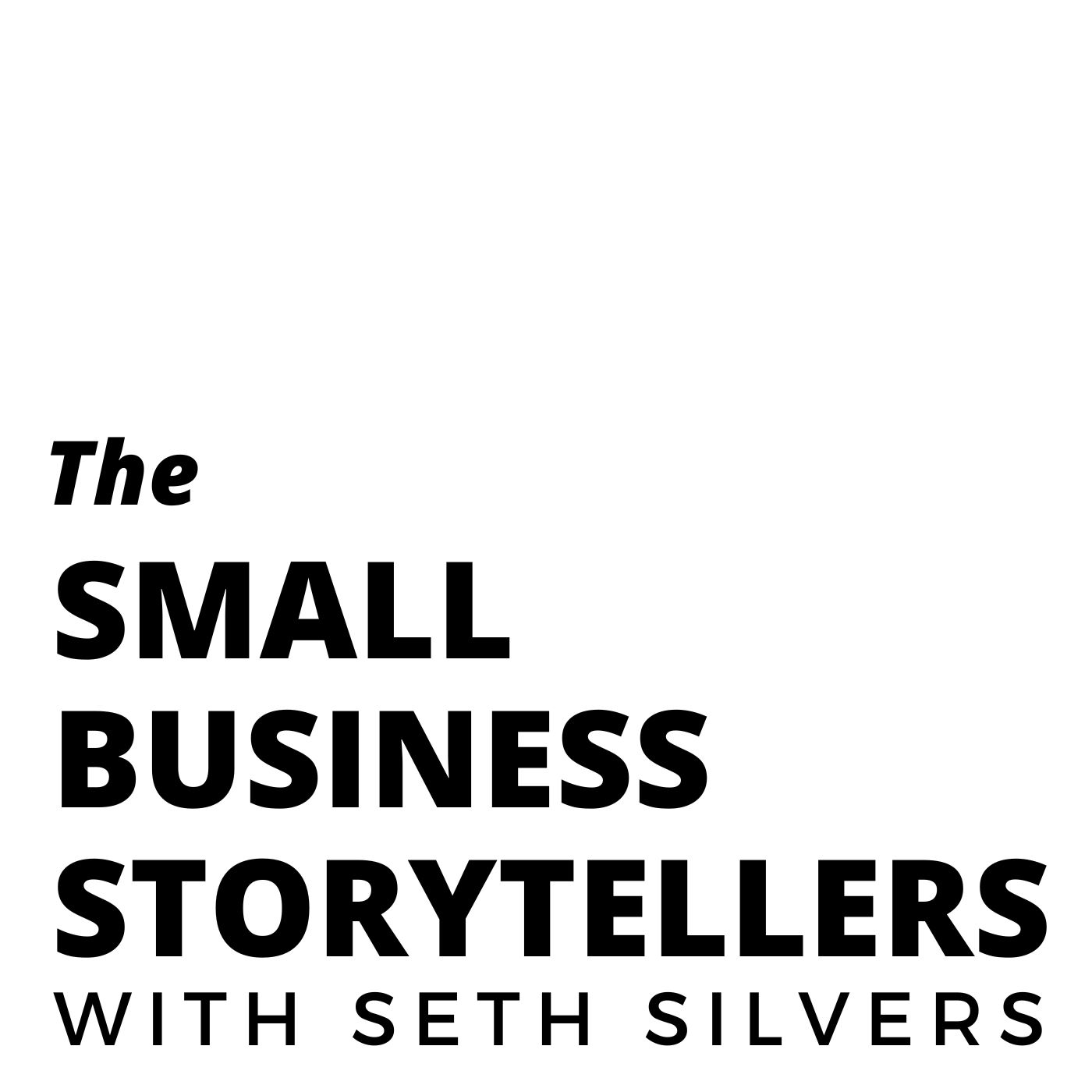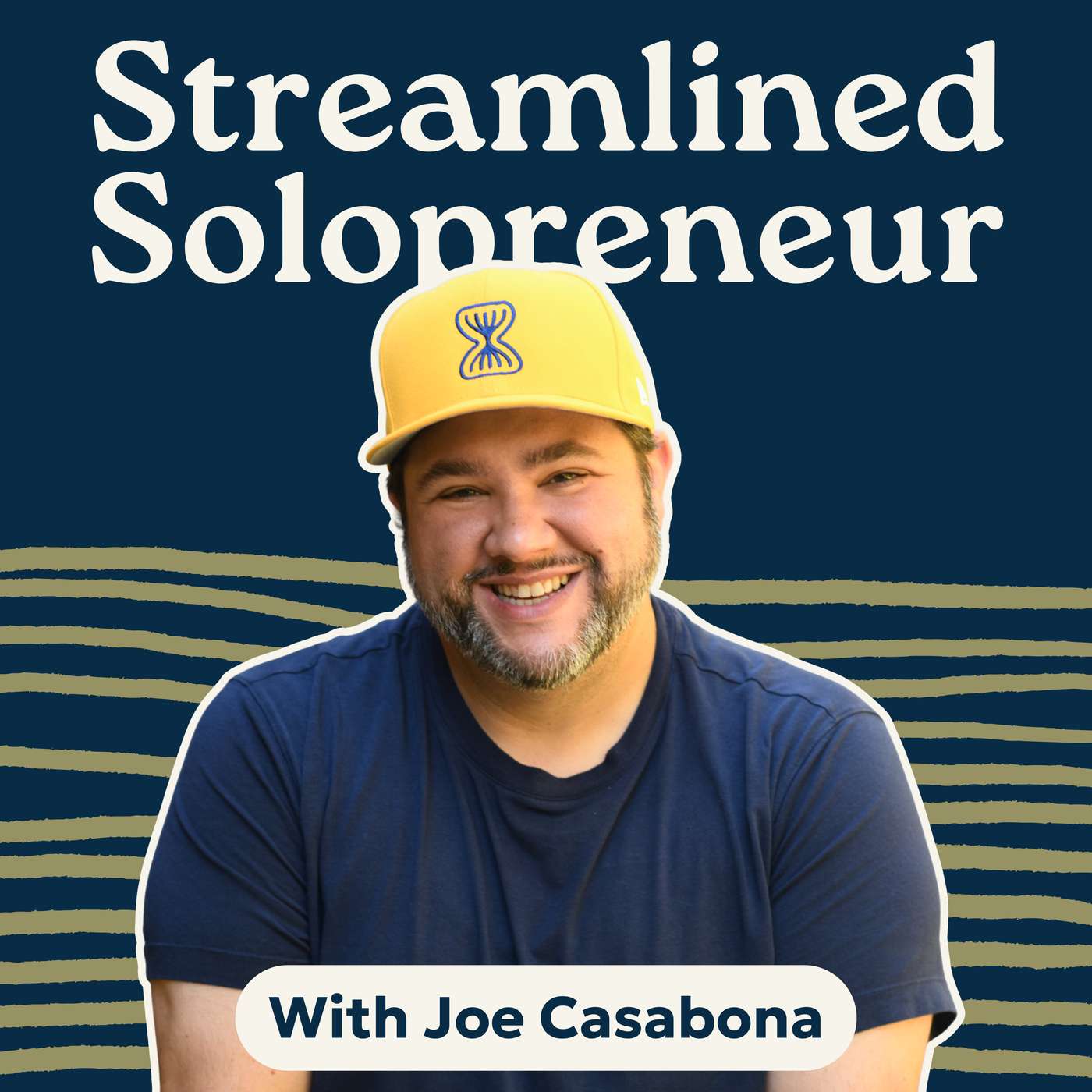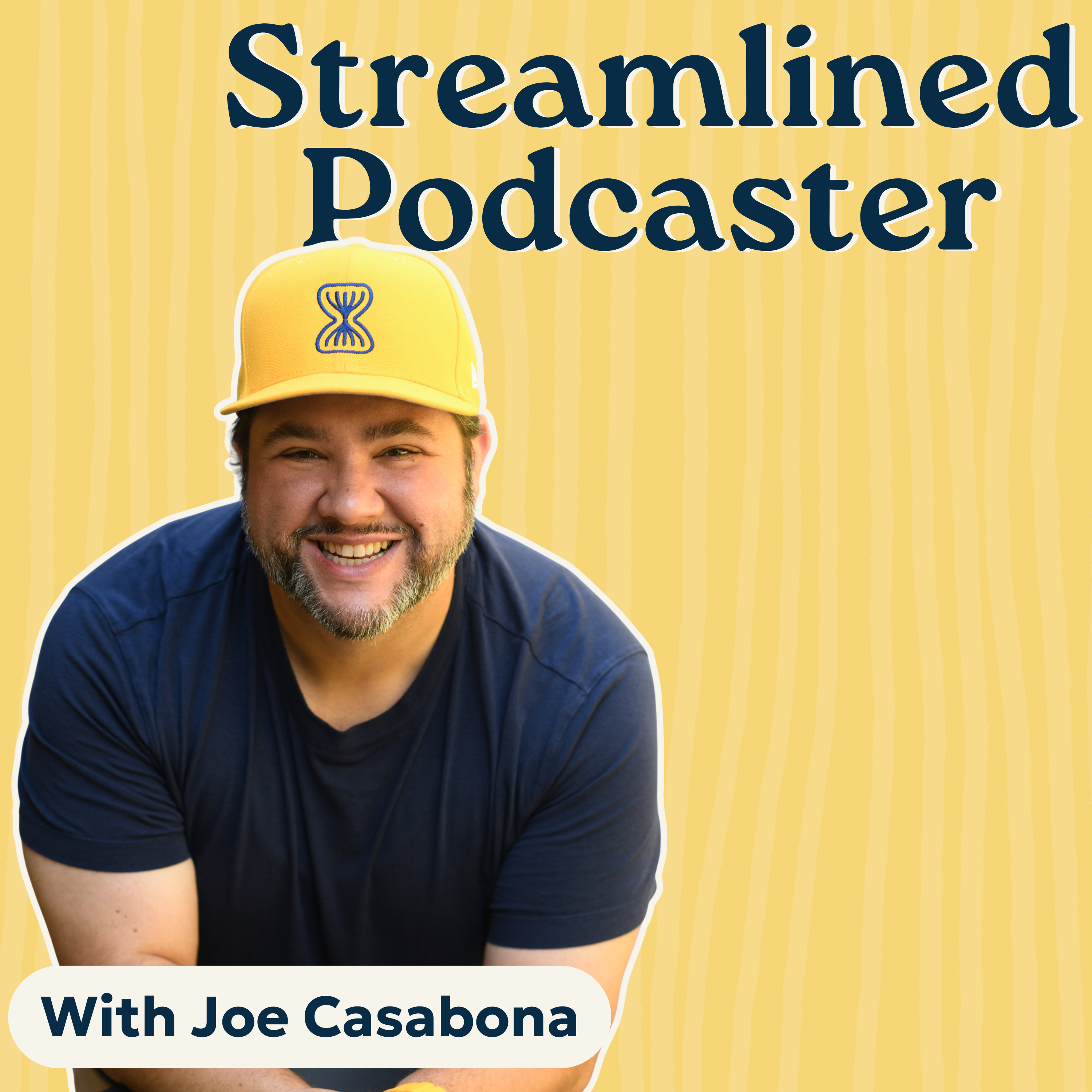
Podcasting Made Simple
Podcasting Made Simple is the premier podcast about podcasting! We’re here to help podcast guests and podcast hosts reach more listeners and grow their income so they can change more lives! Join Alex Sanfilippo and other podcasting industry experts as they share how you can level up on either side of the mic! (Show notes and resources: https://PodMatch.com/episodes)
Podcasting Made Simple
Navigating Sensitive Topics in Podcasting | Chelsea Myers
Discussing sensitive topics on a podcast can be challenging, but the way you handle them makes all the difference. In this episode, Chelsea Myers shares tips for guiding guests through difficult conversations while keeping the focus on their story. Learn how to set boundaries, steer discussions with care, and create a space where guests feel comfortable sharing. Get ready to master the art of covering sensitive topics in a way that honors your guests and serves your listeners!
MORE FROM THIS EPISODE: HTTPS://PODMATCH.COM/EP/336
Chapters
00:00 Navigating Sensitive Topics in Podcasting
02:26 Creating a Comfortable Environment for Guests
04:18 Steering the Conversation Effectively
09:03 Encouraging Guest Participation
12:22 Establishing Boundaries and Comfort Levels
Takeaways
This is not about you; it's about your guest.
Create a comfortable environment for your guests.
Use natural pauses to steer the conversation.
Validate your guest's experiences to make them feel heard.
Be mindful of the questions you ask.
Encourage guests to share their stories.
Establish boundaries before recording sensitive topics.
Use affirmations to show you're listening.
Gently guide guests who may struggle to share.
Building relationships can extend beyond the podcast.
MORE FROM THIS EPISODE: HTTPS://PODMATCH.COM/EP/336
You're listening to Podcasting Made Simple. Hi, I'm Chelsea. As the host of a podcast where guests from all over the world come on to share their stories through some of life's most challenging moments, it's important that I know how to navigate some pretty sensitive topics. And today I'm going to share with you some of the tips that I use to make my recording sessions as comfortable, seamless, and non-judgmental as possible.
This is especially important if you have guests on regularly, but even if you just have guests on every now and then, these are good things to keep in your back pocket and help keep you on track, make sure your conversations are progressing while also allowing grace and space for your guests to share their personal journey. Number one, the most important thing to remember, this is not about you. Unless your podcast specifically is about your opinions,
If your guest is speaking, it is not about you. I constantly have to remind myself not to interject. And it's not in a way that is to stop the guest from speaking or to impress my opinions on the matter. It's more that I will find something that I connect with and I just want to jump in with that, my gosh, me too. Or that's like the time that I'm
It's not the time for that. Make sure your guest feels that they are the only thing that you are paying attention to and that you are giving them your undivided attention. That they are able to speak freely and as openly as they are comfortable in order to share their story authentically. When there are natural pauses, it's okay to interject something. And of course, along the way, I definitely do some like nods and some agreements or even some
size. It's okay to interject natural sounds. Really the most important thing to remember is that when your guest is speaking, it's about them. It's not about you. So that's the biggest takeaway from this whole thing. I just gave it to you in the first less than two minutes. So how do we take that and use that to make sure that the entire recording process goes smooth? And how do we keep our actual episode on track?
so that we're not recording for hours and hours and hours. Well, there are a few things you can do. I like to start each episode by asking my guests to introduce themselves so that I'm not taking that away from them and giving them the time and space to adequately introduce themselves as best they wish. That usually will help me get to know how the rest of the session will go.
the length to which they will describe themselves will give me a clue how much prompting I may need to do, how much digging I may need to do, or how much I'm just going to have to sit back and let them talk. So if I have a guest who gives an intro that goes on for more than three to five minutes, I know I'm in for a ride.
And that's not a bad thing. It just means that I'm going to have to implement a few more of these skills that we're going to talk about to steer the ship and make sure that our time spent together is used effectively while also honoring their story. If I have a guest that gives an intro that is 30 seconds and doesn't tell me hardly anything about them, that cues me in that I am going to have to maybe ask some more guiding questions, maybe
try to dig a little bit deeper into things that they are sharing with me. But again, keeping in mind, this is not about me, this is not about my opinions, and this is not about my experience. Again, this applies to hosts who are mainly doing storytelling projects. But really any host in general who is having a guest on their show should be mindful of these things because your guest is there to share their opinions, their story, their perspective.
So respecting that. So let's talk a little bit about navigating sensitive topics with a guest that has a lot to share. Some of these episodes can be truly the best episodes that you will have. I find that the guests that have a lot to share make the deepest impact with my listeners. And honestly, it can go either way.
in terms of how much or how little you're going to have to work to steer the ship. And when I say steer the ship, I mean staying within your podcast's boundaries and your personal boundaries that you've set for your time together. And here are some ways that I do that. So as my guests are speaking, I am listening, I am nodding, I may interject a sigh or an uh-huh or an yeah, every now and then. And then when I find a break,
where I just did one, that was an example of one, I may reiterate or repeat in a condensed version what I have heard my guests say so far. This allows them to feel validated and it also allows you to take control of the moment and steer where you're gonna go next. So if my guest has just spent the last five
to 10 minutes talking about a very personal experience to them. It could be loss. It could be grief. It could be a mental health struggle. It could be a challenge that they overcame in childhood. And they've been talking on this, and I haven't been doing any talking for quite a period of time. I find that pause and I say, wow, so you found yourself in this situation. This is how you navigated it. And now bring us to
what your next step was in that journey. Or if you want to get really specific and really bring it in, be like, can you tell me about, and then pick somewhere you would like your conversation to go. Be very, very mindful and be thinking about this while your guest is speaking, while also listening to them. Because like I said, you need to reiterate in a condensed way so that they feel heard and validated. And then you can steer the conversation in the direction that you would like it to go.
If a guest does not pause, you're going to have to get creative, especially when navigating sensitive topics. It's incredibly important to make sure that you are not imposing your own beliefs or your own opinions on this guest as they share their story because they are being vulnerable, they are being open, they are being honest, and they're sharing some things with you that they may not have shared with others.
So if they're talking and talking and talking and you just stop them, number one, that feels invalidating. And if you just stop them and then you say, wow, that reminds me of a time when I yada, yada, yada, that's not validating them at all. So what you're going to want to do, and it's going to be a little bit tricky, but you
can't wait for those pauses because you're not going to find one. And you're going to have to use one of those moments where you're doing your small affirmations like, oh yes, I'm hearing you, I'm hearing you, and use that instead. And you're going to go right back to doing the same thing that you do. Even when you do find those breaks and those pauses, you're going to be like, mm, yeah, wow, that sounds like that was really impactful for you.
Yes, for a moment, you might be speaking over them. For just a moment, nine times out of 10, guests get the cue. They understand, and they appreciate you taking the time to sort of tell them what you've heard, tell them how it may have impacted you, again, without imposing opinions and steering it in a direction that you would like to see the conversation go.
This doesn't mean steering it in a way that matches your beliefs or your opinions. It just means steering it in a way that matches your podcast's parameters, your timing parameters, and the boundaries that you have set as a host and a guest. If you have a guest that does not like to do a lot of the talking, which is so interesting to me,
every guest is welcome and every guest's story is valid, some guests just need a little more prompting. And when you're doing this while also navigating conversations with a sensitive topic, you have to be incredibly mindful of the questions that you're asking or the prompts that you're giving. So if you have a guest that you've led with your leading question, you've come up with a great question that you want to ask them to sort of get into their story,
and then they give you like 15 to 30 seconds of a response, you're still gonna validate that and you're still gonna reiterate that. For example, we'll say Tom overcame his battles with a mental health disorder, but all he shares is, hey, I'm Tom, I had OCD and depression and I went to therapy and I'm doing a lot better now.
cool, Tom, that's so cool, that's great for you. You're not going to say that. What you're going to do instead is you're going to say, wow, yeah, that's a lot, or like, that sounds like that was a really challenging time in your life. Can you take me back to the beginning? What were those first realizations when you realized that there was something going on? And then they're going to answer that question. And again, it may be a really short answer. They're going to make you work for it. And that's okay.
Our job as hosts is to make sure that we are creating an environment for our guests that feels welcoming, that feels validating. And we also want to have an impactful episode. So you ask them, you tell me about where this started? And they give you another really short answer. You're going to, again, be like, OK, so.
You found out that these things were an issue when you were in your teens. Who sort of made you aware of that? Or did you discover that on your own? So choosing questions that are directly relevant to what you have just heard, not imposing your opinions. It's so easy to say, depression is such a common thing these days. I know so many people who are diagnosed with
PTSD or OCD or depression or whatever it is, if we're talking about mental health, I know what you went through, that's not going to be helpful. Focusing your questions on what your guest is telling you. So we're going to dive deeper. We're going to go deeper. We've asked them, how did you discover that? When did you discover that? If they're going to give you another really short answer, you're going to, again, take them through those steps. It's honestly like walking them up
a set of stairs to get to the top, to get to a nice conclusion to their story. Because a lot of people are ready to share, they just haven't shared before, so they're not really sure how to go about doing it. So for guests who take a little bit longer, you are going to gently guide them through their own experience. So the two biggest things.
to take away from this, whether your guest has a lot to say or has a hard time sort of walking that path, you need to remember that this is not about you. You keep all those thoughts in your thought bubble. There's a time and a place, obviously, for some connection and some solidarity, but never to the point where it becomes your story and not theirs. So it's not about you.
Try to keep your comments to a minimum and always reflect back what the guest has said to you before proceeding on to the next step in their journey. It's gonna make them feel seen. It's gonna make them feel heard. It's gonna make them feel validated. Some topics may be really sensitive and you're gonna have to set up that boundary before you decide to record. It's a great idea to come up with a survey or a Google
form or something to just sort of get an idea of what your guest wants to share so that you can decide A, if that's something you are comfortable facilitating and B, if that's something you're comfortable sharing with your listeners. You can even set up a call ahead of time to sort of chat about that. Boundaries are a great thing to have in life and in podcasting. finding out if this is going to be a good fit for you.
I guess should have been step number one, but it's very important to sort of understand whether you are equipped personally to handle discussing sensitive topics with your guests. If you are, you are going to make some incredible connections. You are going to learn, you're going to grow, and I can guarantee you there are going to be some relationships that are formed that you will continue beyond just your podcast recording.
So to wrap this all up, I'm repeating and repeating and repeating because it is so important. This is not about you. This is about your guest. Gently steer them and guide them based on the information they have given you, whether that is a lot of information or a little bit of information. Find the windows or create a window if you have to and help them to tell their story.
Thanks so much for letting me chat with you today. And I hope this helps you to navigate some tougher topics when you have guests on your podcasts for storytelling. more episodes, please visit podmatch.com forward slash episodes. Thank you so much for listening.
Podcasts we love
Check out these other fine podcasts recommended by us, not an algorithm.

Content Is Profit
BIZBROS
Win The Content Game
Deirdre Tshien - CEO & co-founder of Capsho, AI-powered Content Marketer (the fastest way to repurpose and market your expert content)
Fastlane Founders and Legacy with Jason Barnard: Personal Branding, AI Strategies, and SEO Insights
Jason Barnard Entrepreneur and CEO of Kalicube
Hacks and Hobbies with Junaid Ahmed
Junaid Ahmed
I Have A Podcast by Vinnie Potestivo
Vinnie Potestivo
The Small Business Storytellers with Seth Silvers
Seth Silvers
Streamlined Solopreneur: Tips to Help Business Owners Grow Without Burnout
Joe Casabona, Automations Builder
Insider Secrets to a Top 100 Podcast with Courtney Elmer | Podcasting Strategy for Business Growth
Courtney Elmer | PodLaunchHQ.comDo The Thing
Stacey Lauren
Tech Bytes - with Dan Hafner
Dan Hafner

